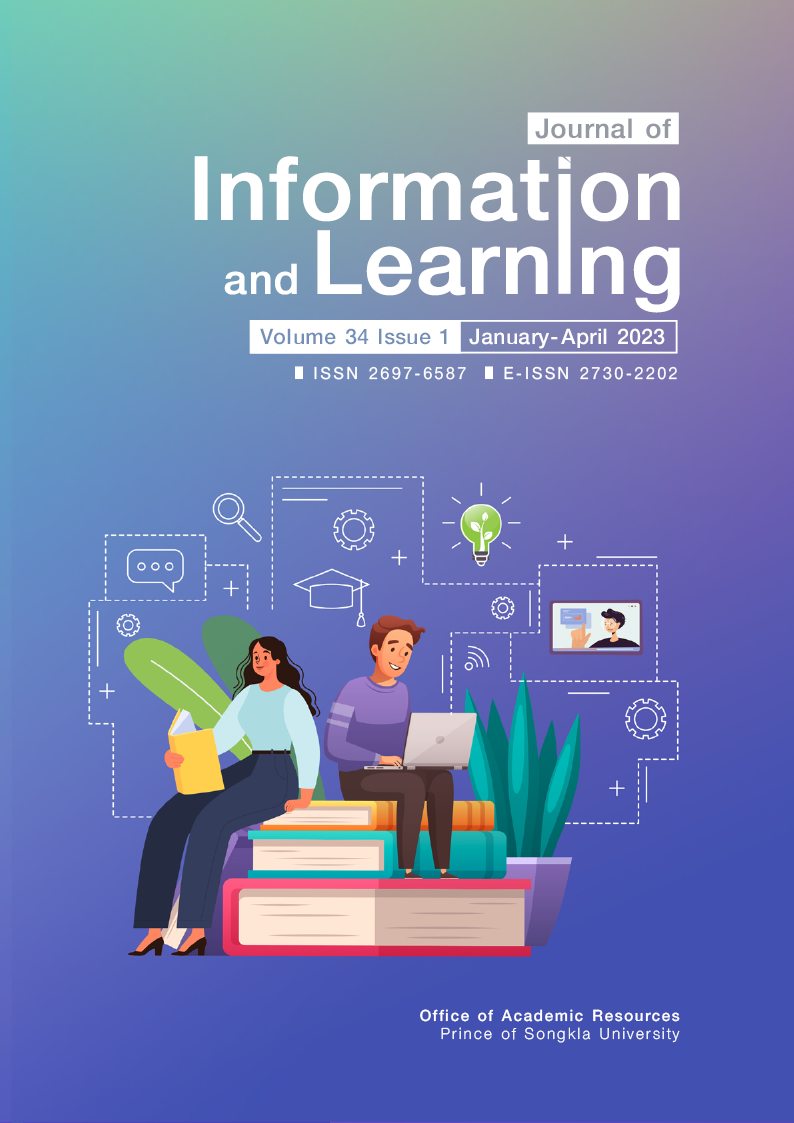A Development of a Learning Model to Promote Digital Citizenship among Undergraduate Students Based on Active Learning Concept and Social Media
Main Article Content
Abstract
The purposes of this research were 1) to develop and assess the quality of an instructional model and 2) to study the effect of using the learning model. The sample consisted of 24 students at Naresuan University’s students during the third semester of the 2022 academic year. The sample was purposively selected. Lesson plans, a digital citizenship scale, a student self-assessment form, and a satisfaction questionnaire, all constituted the research instruments. Data were analyzed using mean, standard deviation, a dependent samples t-test, and content analysis.
The results revealed that the developed model consisted of five components, namely principles, objectives, contents, learning process, and evaluation. The factors supporting learning consisted of three components: online social system, principle of reaction, and supporting system. The learning process consisted of six steps, namely: attention, simulation, research, analysis, construction, and reflection, which has a high level of appropriateness. It was also found that the students’ digital citizenship after the instructional model implementation was significantly higher than before at .05 level. The students' satisfaction towards the model and implementation process was at the high level.
Article Details

This work is licensed under a Creative Commons Attribution-NonCommercial-NoDerivatives 4.0 International License.
The Journal of Information and Learning is operated by the Office of Academic Resources, Prince of Songkla University. All articles published in the journal are protected by Thailand copyright law. This copyright covers the exclusive rights to share, reproduce and distribute the article, including in electronic forms, reprints, translations, photographic reproductions, or similar. Authors own copyrights in the works they have created as well as the Office of Academic Resources. The Journal reserves the right to edit the language of papers accepted for publication for clarity and correctness, as well as to make formal changes to ensure compliance with the journal's guidelines. All authors must take public responsibility for the content of their paper.
References
Autthaporn, J.(2013). Development of an active online instructional model to enhance learning behaviors of undergraduate students [Master’s thesis, Chulalongkorn University] . CUIR. http://cuir.car.chula.ac.th/bitstream/123456789/43141/1/5583371327.pdf
Bellanca, J., Brandt J. (2019). Thaksa hǣng ʻanākhot mai: kānsưksā phư̄a satawat thī 21 (2nd ed.) [21st century skills rethinking how students learn]. Bookscape.
Bunsong, N. (2018). Social media of enhance 21st century education. Veridian E-Journal,Silpakorn University, 11(1), 145-154.
Changkwanyeun, A., Kaewurai, R., Wongthai, W., & Lincharoen, A. (2021). Active learning approach to enhance digital citizenship. Journal of Education Naresuan University, 23(3), 452-465. https://so06.tci-thaijo.org/index.php/edujournal_nu/article/view/240431/169176
Damjub, W. (2019). Social media for teaching and learning in the 21st century. Journal of Liberal Arts, Mae Jo University, 7(2), 143-159. https://so03.tci-thaijo.org/index.php/liberalartsjournal/article/view/232338/158697
Electronic Transactions Development Agency. (2013). Thailand internet user profile 2013. https://www.etda.or.th/th/Useful-Resource/documents-for-download/Thailand-Internet-user-Profile-2013.aspx.
Electronic Transactions Development Agency. (2021). Thailand internet user behavior 2021. https://www.etda.or.th/th/Useful-Resource/publications/Thailand-Internet-User-Behavior-2021_Slides.aspx
Fink, L. D. (2003). Creating significant learning experiences: An integrated approach to designing college courses. Jossey-Bass.
International Society for Technology in Education. (2016). ISTE Standards: Students. https://www.iste.org/standards/iste-standards-for-students
Inthanon, S. (2020). Thaksa kān ʻao čhai khao mā sai čhai rao thāng dičhithan (3rd ed.) [Digital Empathy]. Walk on Cloud.
Joyce, B., & Weil, M. (1996). Model of teaching (5th ed.). Allyn and Bacon.
Joyce, B., Weil, M., & Calhoun, E. (2009). Model of teaching (8th ed.). Pearson Education.
Kaplan, A. M., & Haenlein, M. (2010). Users of the world, Unite! The challenges and opportunities of social media. Business Horizons, 53(1), 59-68.
Kidrakarn, P., & Pattiyathani, S., (2002). Effectiveness index: E.I. Journal of Educational Measure-ment, Mahasarakham University, 8, 30-36.
Marquez, R. (2011). Analysis of social network: Good idea or not?. Kenesaw State University.
Pakdeeviroch, C. (2013). The effects of organizing active learning in mathematical process skills on mathematical problem solving ability, critical thinking ability and self-confidence of matha-yomsuksa III students [Master’s thesis, Srinakharinwirot University]. SWU IR. http://ir.swu.ac.th/jspui/bitstream/123456789/3714/2/Cherdsak_P.pdf
Poolsawasd, B. (2011). Sip konlayut kāntalāt ʻō̜nlai khayao lōk [iMarketing 10.0]. Provision.
Ribble, M. (2011). Digital citizenship in school (3rd ed.). Printed in United States of America.
Thongkhumchuenvivat, J. (2021). The relationships between digital intelligence skills and behav-iors of Thai teenagers’ digital citizenship in Bangkok area. Journal Communication Art Review, 25(3), 232-243. https://so06.tci-thaijo.org/index.php/jca/article/view/251488/169968.
Thummanond, C., Visessuvanapoom, P., Suraseth, C., Wintachai, J., Tantixalerm, C., & Tinmala, D. (2021). The effects of using blended learning program on learning engagement of undergraduate students. Journal of Education Naresuan University, 23(2), 140-151. https://so06.tci-thaijo.org/index.php/edujournal_nu/article/view/244878/168006
Trairut, N. (2020). The development of active learning model through online social networking to promote creative thinking of undergraduate students. Journal of Education, Srinakharinwirot Uni-versity, 21(2), 130-142. http://ejournals.swu.ac.th/index.php/jedu/article/view/13019/10771
Wisetsat, C. (2019). Developing of learning model to enhance innovative thinking skill of pre-service teachers [Doctoral dissertation, Mahasarakham University]. MSUIR. http://202.28.34.124/dspace/bitstream/123456789/35/1/59010563010.pdf


